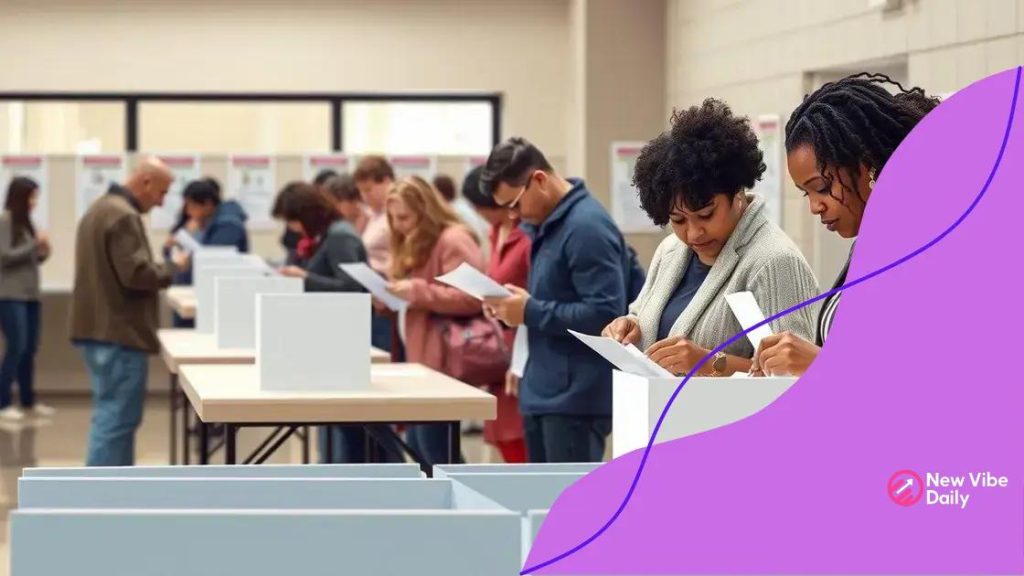Voting rights and election security: what you need to know

Voting rights and election security are crucial components of a democracy, ensuring that every citizen can participate fairly in elections while maintaining the integrity and trust in the electoral process.
Voting rights and election security form the backbone of a healthy democracy. But how much do we really know about these essential topics? Join me as we dive into what’s at stake and how it affects each of us.
Understanding voting rights in the U.S.
In the U.S., voting rights have a deep and complex history. They are the foundation of our democracy and essential for every citizen’s participation in the political process. Understanding the evolution of these rights helps us appreciate their significance.
The Historical Context
Throughout the years, various amendments have expanded voting rights. Starting with the 15th Amendment, adopted in 1870, prohibiting the denial of the right to vote based on race, progress has been made, but challenges remain. The 19th Amendment, ratified in 1920, granted women the right to vote, further widening the electorate. These milestones have shaped the landscape of voting in America.
Current Voting Rights
Today, voting rights are protected under various laws, including the Voting Rights Act of 1965. This legislation aims to eliminate barriers that prevent individuals from exercising their right to vote. However, several issues continue to threaten these rights, such as:
- Voter ID laws that certain populations find difficult to meet.
- Voter suppression tactics, which disproportionately affect minorities.
- Gerrymandering, which manipulates district boundaries to favor one party.
- Accessibility issues for individuals with disabilities.
In each of these areas, advocacy and awareness are essential for maintaining and ensuring the rights of voters. As citizens, it is crucial to understand how these rights impact our democracy and take action to protect them. Active participation, education, and community engagement can drive change and uphold the principles of equality.
The Role of Advocacy Groups
Organizations dedicated to voting rights play a pivotal role. They work tirelessly to promote fair practices and educate the public about their rights. By raising awareness, these groups foster an informed electorate capable of advocating for itself. For example, groups like the NAACP and the ACLU continuously challenge unjust laws and promote legislative changes that enhance access to the ballot.
The role of election security in democratic processes
In our democracy, election security is vital. It ensures that every vote is counted accurately and helps maintain public confidence in electoral outcomes. Without proper security measures, the integrity of elections can be compromised, leading to doubts about the system.
Why Election Security Matters
Election security plays a crucial role in protecting the democratic process. It helps prevent tampering, fraud, and cyberattacks that can undermine voter trust. With the rise of technology in voting systems, ensuring that these systems are secure has never been more critical.
Key Aspects of Election Security
There are several facets to election security that are essential to understand:
- Physical security of polling places to prevent unauthorized access.
- Coding and testing of voting machines to ensure they function correctly.
- Use of paper ballots as a backup for electronic voting systems.
- Training poll workers to identify suspicious activities.
Moreover, states are implementing protocols to safeguard against potential threats. These protocols often include monitoring systems, regular audits of election results, and robust cybersecurity measures.
The Impact of Technology on Election Security
Technology has advanced the way we conduct elections, but it has also introduced vulnerabilities. Electronic voting machines and online voter registration systems need to be continually updated and protected against hacking. Educating voters about how their data is secured is equally important to maintain trust.
Furthermore, collaboration between federal and state authorities is crucial. Sharing information about potential threats and best practices enhances overall security. Voter education plays a significant role, as informed citizens can better understand what measures are in place and how they can help protect the integrity of elections.
Challenges to voting rights today

Today, many challenges threaten voting rights across the United States. These issues impact individuals and communities, raising concerns about the fairness of the electoral process. Identifying these challenges is vital to safeguard our rights.
Voter ID Laws
One significant challenge is the introduction of strict voter ID laws. While proponents argue that these laws prevent fraud, critics highlight that they disproportionately affect minorities and low-income individuals who may lack the required identification. This can lead to disenfranchisement of eligible voters.
Voter Suppression Tactics
Another challenge is various forms of voter suppression. Tactics include closing polling places in certain neighborhoods, reducing voting hours, and implementing confusing registration procedures. These actions make it harder for people to vote, especially in marginalized communities.
- Many voters face long lines and wait times at polling locations.
- Mail-in voting restrictions limit options for those unable to vote in person.
- Felon disenfranchisement laws prevent millions from voting.
- Complex regulations around voter registration can intimidate potential voters.
Additionally, misinformation about voting processes can confuse voters and deter participation. This confusion is often amplified during election cycles, when accurate information becomes crucial.
Impact of Gerrymandering
Another serious concern is gerrymandering, the manipulation of electoral district boundaries to favor specific political parties. This creates unequal representation and undermines the principle of fair elections. Many citizens feel their votes do not matter when districts are drawn to favor one party over another, which can lead to apathy and disengagement from the electoral process.
Addressing these challenges requires collective action. Advocacy groups are working hard to promote awareness and create change. From grassroots movements to legal battles, various efforts aim to restore and protect the fundamental right to vote.
Technologies ensuring election security
Technologies play a crucial role in ensuring election security. They help protect the integrity of voting systems and maintain trust in the electoral process. As technology evolves, so do the measures to secure our elections.
Secure Voting Machines
The first line of defense in election security is the voting machine. Modern voting machines are designed with cybersecurity features to prevent tampering. Many of these machines use digital signatures and encryption to secure votes. Regular testing and certification ensure that these machines meet strict security standards.
Paper Ballots as a Backup
Another important technology is the use of paper ballots alongside electronic voting systems. This provides a reliable audit trail. In case of discrepancies, officials can verify results using the paper records. This redundancy is vital for maintaining electoral integrity.
- Paper ballots allow for a manual recount if needed.
- Using paper reduces dependence on electronic systems alone.
- This method reinforces voter confidence in the process.
In addition to machines and paper ballots, cybersecurity is critical. Protecting the data and networks associated with elections helps ensure that voter information remains safe. Cybersecurity measures include firewalls, intrusion detection systems, and regular software updates to defend against breaches.
Monitoring and Audits
Monitoring systems are also essential. These systems track and log access to voting machines and tally systems. Regular audits help verify that votes were counted accurately. By having trained election officials oversee these processes, the likelihood of errors or fraud diminishes.
Collaboration between local, state, and federal agencies enhances these security measures. By working together, they can share information about potential threats and best practices for protecting elections.
How citizens can advocate for better voting rights
Citizens play a vital role in advocating for better voting rights. By engaging in advocacy, they can help shape policies and ensure that every voice is heard. There are many ways individuals can make a difference in their communities.
Educate Yourself and Others
Understanding voting rights and the current issues is the first step in advocacy. Citizens can start by educating themselves about local and national voting laws. Sharing this knowledge with friends and family fosters a community of informed voters.
Participate in Local Elections
Another way to advocate is by participating in local elections. Voting is a powerful tool that shows leaders how important these issues are to the community. Making sure to vote in every election ensures that elected officials recognize the need for fair voting practices.
- Encourage others to register to vote.
- Attend town hall meetings to voice concerns.
- Contact local representatives about voting rights issues.
- Support candidates who prioritize voting rights.
In addition, volunteer for organizations that focus on protecting voting rights. Many advocacy groups work tirelessly to promote fair practices and educate the public. By joining these organizations, citizens can amplify their efforts.
Use Social Media as a Platform
In today’s digital age, social media is a powerful tool for advocacy. Citizens can use their platforms to raise awareness about voting rights issues. Sharing informative posts and engaging in discussions can inspire others to join the cause.
Moreover, organizing community events and rallies can gather support for initiatives focused on voting rights. Connecting with like-minded individuals can further strengthen these efforts and amplify the message.
FAQ – Questions Frequently Asked About Voting Rights Advocacy
Why is advocating for voting rights important?
Advocating for voting rights ensures that every citizen has a fair opportunity to participate in the democratic process, protecting the integrity of elections.
How can I educate myself about voting rights?
You can read articles, attend workshops, and engage with local organizations focused on voting rights to gain a better understanding of the issues.
What are some actions I can take to support better voting rights?
You can vote in every election, volunteer for advocacy groups, and contact your representatives to express your concerns about voting issues.
How can social media help in advocating for voting rights?
Social media can be used to raise awareness, share information, and mobilize others to participate in advocacy efforts and community events.






